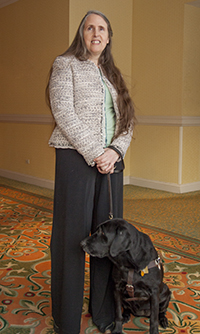Editor's note: We weren't too surprised to read the following question in the most recent installment of "Dear Prudence" on Slate:
Q. Blindness: I am blind, and I wear dark glasses and use a cane. My problem is that everywhere I go, strangers will come up and grab me to help me walk and yell at me as if I am deaf. I know they mean well, but it throws off my balance when they grab me and it’s scary. I get a headache from people yelling at me. I can hear quite well so what can I do? Being blind does not mean I can’t walk or hear. I find myself staying home rather than deal with people. Suggestions?
Mallory Ortberg, the new "Prudence," offered several sensible suggestions, including stepping back and saying clearly, “Please don’t touch me” or “Please don’t yell at me. I can hear you fine.” But she also opened the floor to her readers with the question: "Are there any readers with vision impairments who have had similar experiences? Do you have any tips for keeping overbearing do-gooders at bay that you’d like to share?"
Boy, have we. And yes, luckily Crista Earl, AFB's director of web services and a New Yorker who deals with large numbers of well-meaning sighted people on the regular, has developed some strategies she was willing to share.

I’m much too familiar with the behavior the reader describes. I travel the streets of New York, and I used to use a white cane. When I was considering getting a dog, my dog-guide-using friends would suggest that if people were grabbing me, having a dog would cut down on this behavior. Sure enough, although that wasn’t the reason I switched to a dog, the problem went miraculously away.
Last summer, my dog was out of commission with a leg issue for about three months, and I went back to using my trusty cane. I was amazed at the amount of meddling I got! At nearly every intersection, (it’s New York City, remember, people all over the place) somebody would either shout at me or grab me. I’m pretty sure I don’t look helpless, and I am definitely not.
So, after a few days of declaring I was going to trade in my cane for a machete (not good advice, by the way), I remembered my old, pre-dog-guide tricks. Here they are. I hope they work for you:
- If someone takes hold of you while trying to help—say, someone speaking to you at an intersection, then wrapping their arms around your arm while crossing the street—laugh and say “no grabbing” in the nicest way you can. When you say it that way, they’ll almost always realize how silly (OK: stupid, but I’m trying to be nice here) it is and let go.
- If they shout unhelpful (or even helpful) directions at you, say “thank you.” It almost always ends the shouting. You might have to practice a polite, dismissive tone.
- If it’s a transaction you’re trying to complete, and you’re trying to have a normal conversation, say with a bellowing store clerk, lower your voice and answer them in a volume lower than the usual. They’ll lower their volume in response.
- If they grab you without warning and startle you, feel free to demonstrate your shock. If you’re like me, it’s immediately obvious by the look on your face, so don’t try to act like they didn’t just scare the gizzard out of you. Who wouldn’t be shocked and terrified at being grabbed from behind in the middle of a busy street, or with one foot on the escalator?
- Write a book. Each silly incident makes great material for a new chapter. I have so many stories...and they are all funny, once you get done being shook up.
Most of the time people are thinking of a way that they can help another person, and they think they’ve chosen a good way. If they gave it a moment’s thought, they surely wouldn’t do the things they do, and, really, most people don’t do these things.
More tips?
- When people shout “Go left,” you should go right. They almost always get it wrong. Maybe not always, but 60% of the time, in my unscientific estimate.
- When people say “Miss, you’re going the wrong way,” consider asking them how they know where you’re going. Do it nicely, of course (no point in both of you being frustrated). Sometimes they’ll actually tell you where they thought you were going, and in the process realize how silly it was to think they could know. And, you’ll have one more piece of insight for your chapter 3 on stereotypes people have about blind people.
- If they ask you impertinent questions, tell them, nicely again (hope this isn’t too much niceness, you see how this stuff gets pretty tedious), that you’d rather not answer.
Remember that you aren’t public property, and don’t let people think you are.